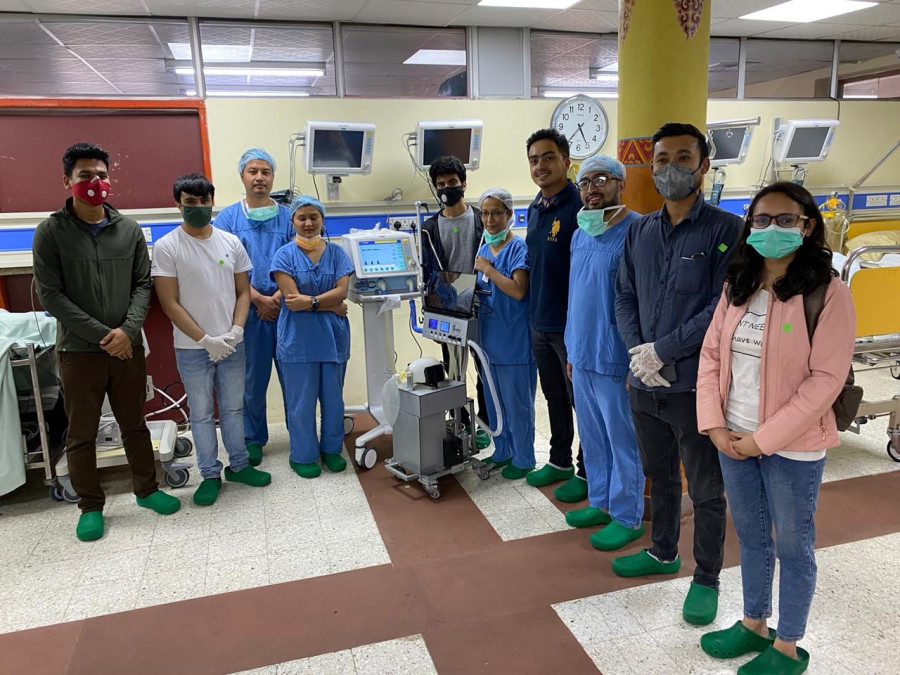Science & Technology
After interactive humanoids, this Lalitpur-based start-up is developing ventilators
As cases of Covid-19 rise, Paaila Technology becomes the first start-up in the country to make portable ventilators and robot nurses to assist health facilities in case of an overwhelming outbreak.
Srizu Bajracharya
Up until early February, Rabin Giri was heading ambitiously to work. His company, Paaila Technology, which focuses on the development of robotics and artificial intelligence, was at the top of their game. The company had just launched a robot service at the Tribhuvan International Airport that would greet passengers. They were also making banking robots while simultaneously working on making chatbots for various businesses to offer a quick solution to customer inquiries.
For this group of innovators, 2020 was a promising year. However, by the beginning of March, things started changing. As the number of Covid-19 cases rose, the government announced a nation-wide lockdown, which meant their company had some urgent rethinking to do.
“We were starting to think about how we as a tech company could be part of a solution to mitigate the crisis the world was having,” says Giri, who is also the head of robotics at Paaila Technology. By this point, global news was rife with the shortage of ventilators, an appliance for artificial respiration. There weren’t enough ventilators for patients of Covid-19 and people were dying. In Italy, amid the outbreak of the virus, doctors were being made to choose which patients should get the machines to help them breathe.
That was when Giri thought of creating ventilators. Soon, he was discussing its possibility with his executive team. “We had the technical capacity to make ventilators, and we decided to go ahead and start making them,” says Giri.
“If big, powerful countries did not have enough ventilators, imagine what the situation would be for a country like Nepal if there were to be a major outbreak,” says Aayush Kasajoo, the executive director and co-founder of the company.
The following days, with just half their total number of staff, because of the country lockdown, the Paaila team invested all their time to understand and develop a prototype. The team worked closely with biomedical engineers and medical professionals day and night, and in 20 days, the company was ready with a prototype that weighed 25 kgs. It was a simple Ambu bag-based ventilator that could assist initial respiratory support to any patient with respiratory failure. It also had a USP support for power back up, and a monitoring screen that could give the graph readings to doctors besides buttons that could control inspiratory: expiratory ratio, respiratory rate, minute volume and pressure limitations.
“The device, of course, cannot replace the ICU ventilator, as it's a very simplified ventilator. But it can definitely assist in acute respiratory distress syndrome cases. Our product is particularly oriented towards the times we are living in,” says Sagar Shrestha, head of product development at Paaila Technology.
The team, however, also believes, in a country like Nepal, where health centres and medical institutions still do not have adequate ventilators, their product can be of great service to patients who require immediate respiratory care, especially in the rural areas.
The company has successfully developed mainly three types of ventilators, which have received the green light from medical professionals at Bir Hospital, Tribhuvan University Teaching Hospital and Dhulikhel Hospital. A team of anesthesiologists from Dhulikhel Hospital, in a report, also acknowledged appreciation for their hard work and have also been working with the team to improve and upgrade the ventilators. At Dhulikhel, their ventilator was also tested against the standard ventilators to check the device’s calibration, accuracy and parameter.
“For the certification process from the Ministry of Health, we have tested our devices in a trauma centre. The centre has given us some feedback, and we are currently working on that. Once that is done, we can help Covid-19 patients,” says Shrestha.
The young innovators also believe at a time like this, Nepal can benefit a lot from local manufacturing companies, more so because imports of products will be difficult and costly. “Right now the whole world is struggling and we live in a situation where countries first have to be able to help themselves. So, I think our ventilators can be very useful,” says Binay Raut, CEO and co-founder of Paaila Technology.
Besides coming up with ventilators, Paaila Technology has also developed nursing robots and ultraviolet disinfectants. “The nursing robots are an adaptive tweak to our navigating robots to fit the needs of our time when social distancing is mandatory,” says Shrestha.
For the company, the main challenge right now, however, is getting materials needed to increase production, as the lockdown and the restrictions on flights have created a shortage of required materials.
But before they get into production, they need the go-ahead from the government, which is currently in the works. Seeing the potential of their machines, the government has been running trial runs of their products in trauma centres under the supervisions of doctors. The company is also working with the government to make guidelines for using the product and is pacing towards certification of their ventilators from the Ministry of Health.
“It’s very encouraging to see their motivation,” says Dr Khem Karki, a health expert and advisor at the Ministry of Health and Population. “However, we are still working on making standards to approve their work. We don’t have a legal regulatory body yet in the country to license such work. And therefore to help them, we first need to expand our capacity and need to compare with a standard that can say that their appliances can be used to save human lives,” says Karki.
While matters of approval can impede the project, Paaila in the meantime hopes to get clearance from the Medical Association and Nepal Medical Council for their ventilators.
“Right now we are not looking for applause from people for the work we are doing; just having one prototype of a ventilator is not good enough,” says Raut. “What we want right now is to be able to get our products to places where they are needed the most. We want to be part of a solution and want to inspire people to contribute locally to the problem we are facing now.”




 9.89°C Kathmandu
9.89°C Kathmandu











